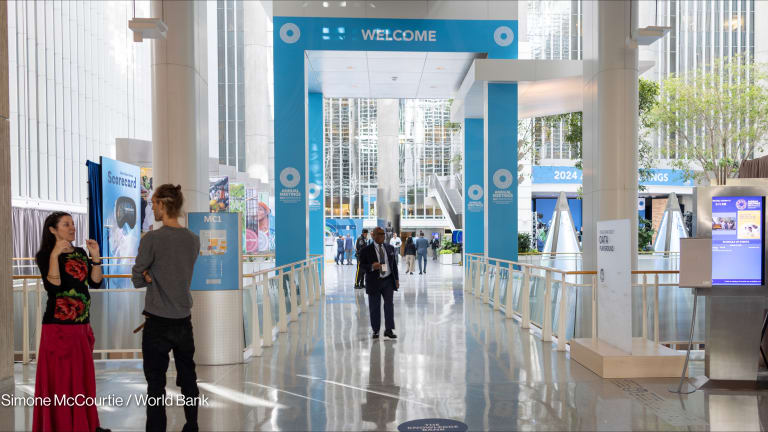
Debt levels are rising rapidly around the world, as low-income countries saw their debt burdens rise 12% in 2020 to a record $860 billion, according to a new report the World Bank released Monday ahead of its annual meeting.
“That raises the concern about sustainability,” the bank’s president David Malpass told reporters. Nations’ fiscal response to the COVID-19 crisis to help cushion the blow of an economic slowdown and rising health needs have weighed on budgets that were heading in the wrong direction even prior to 2020, according to the bank.
The World Bank and International Monetary Fund’s annual meetings are getting under way in Washington this week, with no clear sign on the fate of embattled IMF chief Kristalina Georgieva, as the fund’s board wrangles over whether she will stay or go.
“If a country has unsustainable debt, there has to be a mechanism for having the private sector involved. The common framework urged that, but it’s been difficult to achieve.”
— David Malpass, president, World BankMeanwhile, the World Bank is trying to push an image of business as usual, even as its now-canceled Doing Business report remains at the center of the scandal. Georgieva is accused of pushing for data manipulation in favor of China in the flagship publication’s 2018 edition, while she was the bank’s chief executive.
Malpass told reporters Monday that the institution remains committed to working with the private sector on development, seemingly rejecting the idea that the reputation and credibility of the institution is in peril — particularly with regard to its data reporting.
There appears to be a growing divide between the United States and Europe over whether Georgieva should leave her post. Progressive economists are pushing for her to remain, citing her record on climate change and support for poorer nations, including the recent issuance of $650 billion in Special Drawing Rights.
All you need from the annual meetings
To get on-the-ground coverage, in-depth analysis, and behind-the-scenes reporting from the World Bank annual meetings, sign up for our special edition newsletters.
Even with the allocation of the special assets from IMF, debt is a key issue. Malpass said the world needed to make progress toward a “comprehensive approach” for debt reduction and relief, pointing out that about half of the world’s poorest countries “are in external debt distress or at high risk of it.”
He also warned that there is no modern permanent mechanism for dealing with unsustainable sovereign debt loads and urged the G-20 to step up.
The Heavily Indebted Poor Countries debt relief program from the 1990s has effectively been exhausted. After Sudan got debt relief this year, only one country, Eritrea, remains eligible under the program.
The so-called Common Framework for debt relief has seen a tepid uptake, with only three eligible countries signing on. That’s in part because they fear how investors will react to them seeking support, potentially damaging their ability to raise capital on the market.
5 things to watch at the World Bank-IMF annual meetings
Experts say they want to see progress on financing for vaccine rollouts, reallocation of reserve assets, and debt relief. But will a scandal around a bank publication overshadow everything?
The suspension of debt servicing to G-20 countries, or DSSI program, is due to expire at the end of the year, and it remains to be seen whether it will be extended. A key concern Malpass has raised regularly is that the private sector never got on board with letting struggling nations delay debt repayments during the COVID-19 crisis.
“If a country has unsustainable debt, there has to be a mechanism for having the private sector involved. The common framework urged that, but it’s been difficult to achieve,” he said Monday.
Moreover, a recent report warned that Chinese lending done through opaque mechanisms may mean the burden around the world is greater than previously thought. Malpass said he was worried a lack of transparency on the structuring of debt is also hurting countries’ ability to get relief.
He further warned that the recovery from the COVID-19 economic downturn continued to sharply diverge, with advanced countries set to see their economies expand significantly this year, but the poorest countries will be left behind.
The new World Bank forecast is for 5.7% global expansion this year and 4.4% next year, but Malpass said the low-income nations will only grow by 0.5% on a per capita basis. In the poorest countries, output will remain 5.6% below pre-pandemic projections by next year.
“The inequality is getting worse,” Malpass said.
The combination of crisis debt, slow growth, and the potential for fiscal tightening could spell real trouble ahead for vulnerable nations.
“Policymakers need to prepare for the possibility of debt distress when financial market conditions turn less benign, particularly in emerging market and developing economies,” Carmen Reinhart, the bank’s chief economist, said in a statement Monday.








